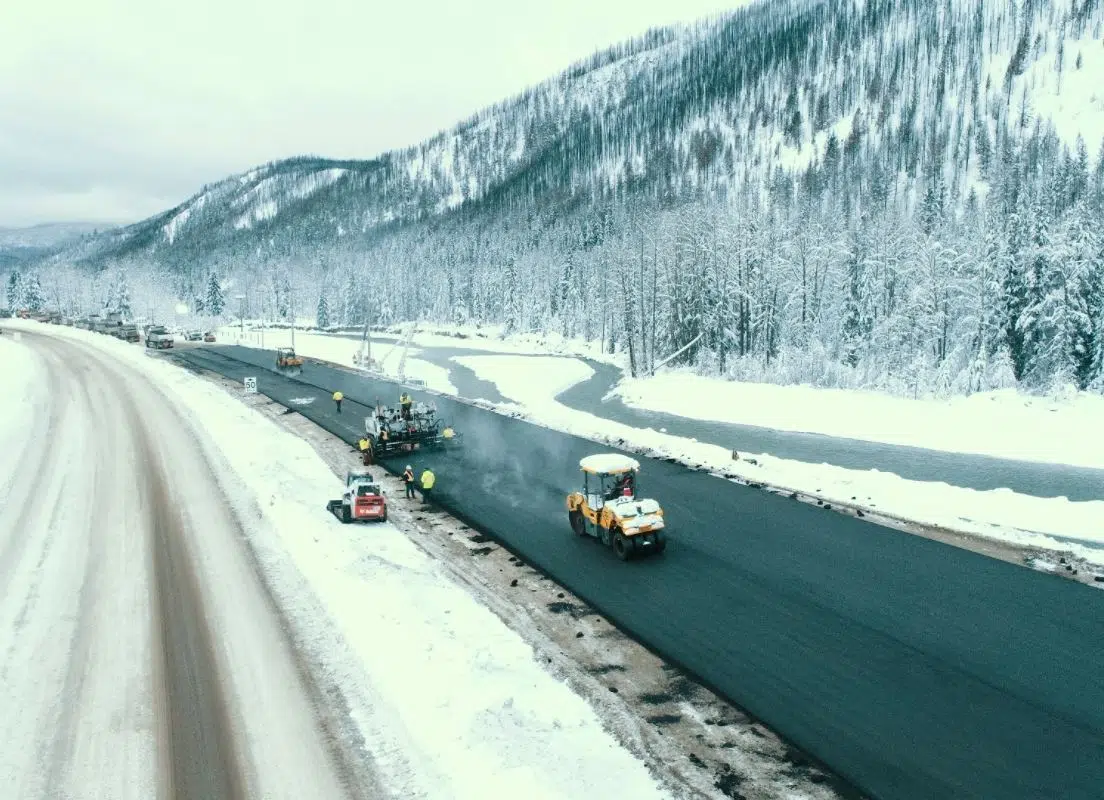
Crews paving a section of the Coquihalla on Sunday, Dec. 19, ahead of the opening on Monday, Dec. 20. (Photo via TranBC)
B.C.’s Transportation Minster says the section of the Coquihalla between Hope and Merritt will be open to all traffic tomorrow, Jan. 19.
It comes a little over two months after sections of the highway were washed out by flooding and mudslides during November’s atmospheric river storms.
Rob Fleming is urging caution if you’re on the highway noting the trip between Hope and Merritt will take about 45 minutes longer than normal because of some two lane sections and ongoing speed reductions.
“Electric vehicle charging stations also remain out of service due to damage from the storms and some rest areas are closed,” he said. “For everyone’s safety, it is imperative that all motorists obey the posted speed limits and do not pass in these sections.”
This full reopening comes a month after the Coquihalla was opened to commercial vehicles and inter-city buses, on Dec. 20.
“This will be a much more convenient route for people going to and from the Lower Mainland to the Interior,” Fleming added. “We have had of course some weather related issues with a strong winter of heavy snow events, however the areas where temporary repairs are in place are functioning well.”
“There will continue to be rather increased enforcement from the RCMP and Commercial Vehicle Safety Enforcement, CVSE, on this route to ensure that drivers are being safe and that they are driving to the winter conditions.”
With the full reopening of the Coquihalla, Fleming noted that the state of emergency due to the flooding, put in place on Nov. 17 will end at midnight Tuesday.
Weight restrictions on Highway 99 from Pemberton and Lillooet will also removed as of tomorrow, he noted, though heavy commercial vehicles are being told to avoid that highway because of the steep terrain.
Work resumes on Highway 1 south of Kanaka Bar
Fleming also says crews are back working on the section of Highway 1 through the Fraser Canyon between Boothroyd and Kanaka Bar now that the avalanche risk has subsided.
“At Jackass Mountain, we have a single lane 260 foot temporary bridge being installed where a large section of the two lane road was completely wiped out. When this section opens, drivers will have a pilot car service here for about four kilometres because of the risk of avalanche in the area.”
On Friday last week, Highway 1 between Kanaka Bar and Spences Bridge was opened to all vehicles up to 25 metres in length, after temporary repairs at Tank Hill, the Nicomen Bridge, and at the Gladwin Culvert site.
Fleming remains optimistic that this final section of the Trans Canada Highway will be open to traffic by the end of this month.
“This again will open up another route connecting the Lower Mainland with the Interior and the North,” Fleming said. “Similar to the Coquihalla though, it will not be as it was. There will be lengthy delays with additional travel times of up to two hours or more because of reduced speed limits, lane restrictions, and an at-grade railroad crossing at Tank Hill.”
Meanwhile, work is also ongoing on Highway 8 between Merritt and Spences Bridge.
Temporary repairs are expected to be in place in the months ahead so people can access their homes by the spring, Fleming added.
Last week, the Ministry of Transportation and Infrastructure said there will be checkpoints set up to limit access on that highway to residents of the Shackan and Cook’s Ferry Indian Bands, as well as the TNRD.
Residents hoping to request such a pass – or those seeking more information – are being told to contact the TNRD or their band office.
Fleming also said Tuesday that final costs for these temporary repairs are not yet available but the early estimates are in the range of $170-million to $220-million.
Between $45-million and $55-million is what repairs to the Coquihalla cost, Fleming notes, adding these estimates do not include any of the permanent repairs that will be done to highways in the province.
















